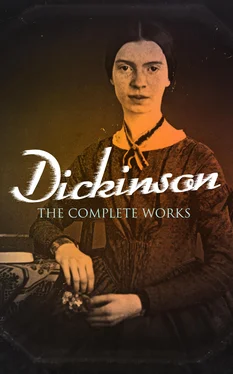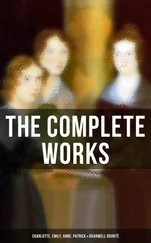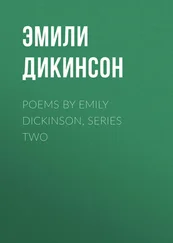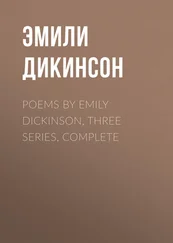1 ...6 7 8 10 11 12 ...25 You cannot prick with saw,
Nor rend with scymitar.
Two bodies therefore be;
Bind one, and one will flee.
The eagle of his nest
No easier divest
And gain the sky,
Than mayest thou,
Except thyself may be
Thine enemy;
Captivity is consciousness,
So's liberty.
Table of Contents
I lost a world the other day.
Has anybody found?
You'll know it by the row of stars
Around its forehead bound.
A rich man might not notice it;
Yet to my frugal eye
Of more esteem than ducats.
Oh, find it, sir, for me!
XXXVII. "If I shouldn't be alive"
Table of Contents
If I shouldn't be alive
When the robins come,
Give the one in red cravat
A memorial crumb.
If I couldn't thank you,
Being just asleep,
You will know I'm trying
With my granite lip!
XXXVIII. "Sleep is supposed to be"
Table of Contents
Sleep is supposed to be,
By souls of sanity,
The shutting of the eye.
Sleep is the station grand
Down which on either hand
The hosts of witness stand!
Morn is supposed to be,
By people of degree,
The breaking of the day.
Morning has not occurred!
That shall aurora be
East of eternity;
One with the banner gay,
One in the red array, —
That is the break of day.
XXXIX. "I shall know why when time is over"
Table of Contents
I shall know why, when time is over,
And I have ceased to wonder why;
Christ will explain each separate anguish
In the fair schoolroom of the sky.
He will tell me what Peter promised,
And I, for wonder at his woe,
I shall forget the drop of anguish
That scalds me now, that scalds me now.
XL. "I never lost as much but twice"
Table of Contents
I never lost as much but twice,
And that was in the sod;
Twice have I stood a beggar
Before the door of God!
Angels, twice descending,
Reimbursed my store.
Burglar, banker, father,
I am poor once more!
Table of Contents Table of Contents Poems: First Series Poems: Second Series Poems: Third Series The Single Hound The Life and Letters of Emily Dickinson
PREFACE
BOOK I.—LIFE
I. "I'm nobody! Who are you?"
II. "I bring an unaccustomed wine"
III. "The nearest dream recedes unrealized"
IV. "We play at paste"
V. "I found the phrase to every thought"
VI. Hope
VII. The White Heat
VIII. Triumphant
IX. The Test
X. Escape
XI. Compensation
XII. The Martyrs
XIII. A Prayer
XIV. "The thought beneath so slight a film"
XV. "The soul unto itself"
XVI. "Surgeons must be very careful"
XVII. The Railway Train
XVIII. The Show
XIX. "Delight becomes pictorial"
XX. "A thought went up my mind to-day"
XXI. "Is Heaven a physician?"
XXII. The Return
XXIII. "A poor torn heart, a tattered heart"
XXIV. Too Much
XXV. Shipwreck
XXVI. "Victory comes late"
XXVII. Enough
XXVIII. "Experiment to me"
XXIX. My Country's Wardrobe
XXX. "Faith is a fine invention"
XXXI. "Except the heaven had come so near"
XXXII. "Portraits are to daily faces"
XXXIII. The Duel
XXXIV. "A shady friend for torrid days"
XXXV. The Goal
XXXVI. Sight
XXXVII. "Talk with prudence to a beggar"
XXXVIII. The Preacher
XXXIX. "Good night! which put the candle out?"
XL. "When I hoped I feared"
XLI. Deed
XLII. Time's Lesson
XLIII. Remorse
XLIV. The Shelter
XLV. "Undue significance a starving man attaches"
XLVI. "Heart not so heavy as mine"
XLVII. "I many times thought peace had come"
XLVIII. "Unto my books so good to turn"
XLIX. "This merit hath the worst"
L. Hunger
LI. "I gained it so"
LII. "To learn to transport by the pain"
LIII. Returning
LIV. Prayer
LV. "I know that he exists"
LVI. Melodies Unheard
LVII. Called Back
BOOK II.—LOVE.
I. Choice
II. "I have no life but this"
III. "Your riches taught me poverty"
IV. The Contract
V. The Letter
VI. "The way I read a letter's this"
VII. "Wild nights! Wild nights!"
VIII. At Home
IX. Possession
X. "A charm invests a face"
XI. The Lovers
XII. "In lands I never saw, they say"
XIII. "The moon is distant from the sea"
XIV. "He put the belt around my life"
XV. The Lost Jewel
XVI. "What if I say I shall not wait?"
BOOK III. NATURE.
I. Mother Nature
II. Out of the Morning
III. "At half-past three a single bird"
IV. Day's Parlor
V. The Sun's Wooing
VI. The Robin
VII. The Butterfly's Day
VIII. The Bluebird
IX. April
X. The Sleeping Flowers
XI. My Rose
XII. The Oriole's Secret
XIII. The Oriole
XIV. In Shadow
XV. The Humming-Bird
XVI. Secrets
XVII. "Who robbed the woods?"
XVIII. Two Voyagers
XIX. By the Sea
XX. Old-Fashioned
XXI. A Tempest
XXII. The Sea
XXIII. In the Garden
XXIV. The Snake
XXV. The Mushroom
XXVI. The Storm
XXVII. The Spider
XXVIII. "I know a place where summer strives"
XXIX. "The one that could repeat the summer day"
XXX. The Wind's Visit
XXXI. "Nature rarer uses yellow"
XXXII. Gossip
XXXIII. Simplicity
XXXIV. Storm
XXXV. The Rat
XXXVI. "Frequently the woods are pink"
XXXVII. A Thunder-Storm
XXXVIII. With Flowers
XXXIX. Sunset
XL. "She sweeps with many-colored brooms"
XLI. "Like mighty footlights burned the red"
XLII. Problems
XLIII. The Juggler of Day
XLIV. My Cricket
XLV. "As imperceptibly as grief"
XLVI. "It can't be summer,—that got through"
XLVII. Summer's Obsequies
XLVIII. Fringed Gentian
XLIX. November
L. The Snow
LI. The Blue Jay
BOOK IV. — TIME AND ETERNITY.
I. "Let down the bars, O Death!"
II. "Going to heaven!"
III. "At least to pray is left, is left"
IV. Epitaph
V. "Morns like these we parted"
VI. "A death-blow is a life-blow to some"
VII. "I read my sentence steadily"
VIII. "I have not told my garden yet"
IX. The Battle-Field
X. "The only ghost I ever saw"
XI. "Some, too fragile for winter winds"
XII. "As by the dead we love to sit"
XIII. Memorials
XIV. "I went to heaven"
XV. "Their height in heaven comforts not"
XVI. "There is a shame of nobleness"
XVII. Triumph
XVIII. "Pompless no life can pass away"
XIX. "I noticed people disappeared"
XX. Following
XXI. "If anybody's friend be dead"
XXII. The Journey
XXIII. A Country Burial
XXIV. Going
XXV. "Essential oils are wrung"
XXVI. "I lived on dread; to those who know"
XXVII. "If I should die"
XXVIII. At Length
XXIX. Ghosts
XXX. Vanished
XXXI. Precedence
XXXII. Gone
XXXIII. Requiem
XXXIV. "What inn is this?"
XXXV. "It was not death, for I stood up"
XXXVI. Till the End
XXXVII. Void
XXXVIII. "A throe upon the features"
XXXIX. Saved
XL. "I think just how my shape will rise"
XLI. The Forgotten Grave
XLII. "Lay this laurel on the one"
Table of Contents
The eagerness with which the first volume of Emily Dickinson's poems has been read shows very clearly that all our alleged modern artificiality does not prevent a prompt appreciation of the qualities of directness and simplicity in approaching the greatest themes,—life and love and death. That "irresistible needle-touch," as one of her best critics has called it, piercing at once the very core of a thought, has found a response as wide and sympathetic as it has been unexpected even to those who knew best her compelling power. This second volume, while open to the same criticism as to form with its predecessor, shows also the same shining beauties.
Читать дальше












